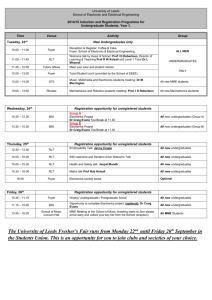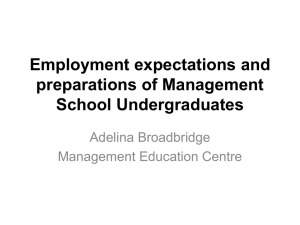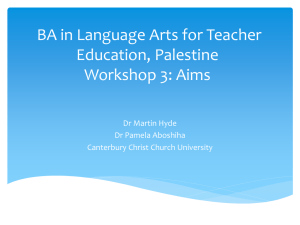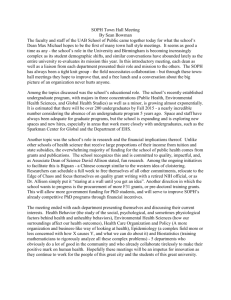Scoring Rubric for Academic Year Proposals submitted to CURCA
advertisement
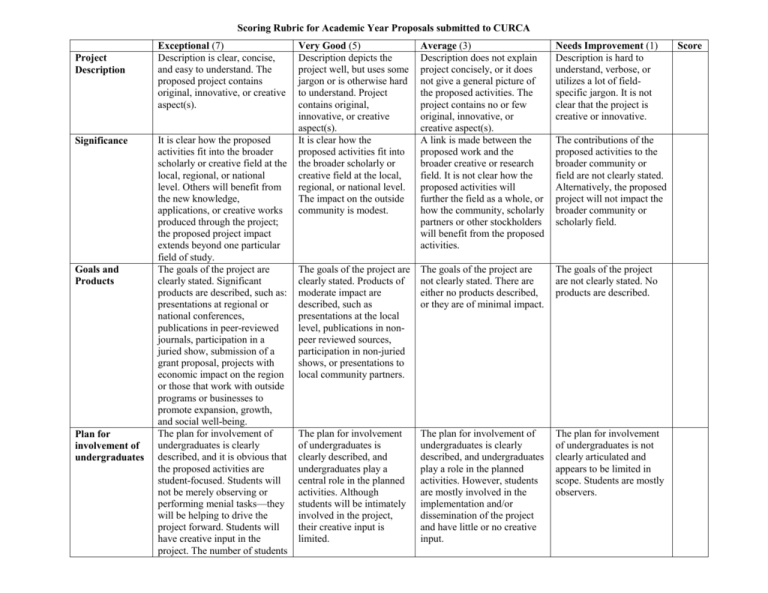
Scoring Rubric for Academic Year Proposals submitted to CURCA Project Description Significance Goals and Products Plan for involvement of undergraduates Exceptional (7) Description is clear, concise, and easy to understand. The proposed project contains original, innovative, or creative aspect(s). It is clear how the proposed activities fit into the broader scholarly or creative field at the local, regional, or national level. Others will benefit from the new knowledge, applications, or creative works produced through the project; the proposed project impact extends beyond one particular field of study. The goals of the project are clearly stated. Significant products are described, such as: presentations at regional or national conferences, publications in peer-reviewed journals, participation in a juried show, submission of a grant proposal, projects with economic impact on the region or those that work with outside programs or businesses to promote expansion, growth, and social well-being. The plan for involvement of undergraduates is clearly described, and it is obvious that the proposed activities are student-focused. Students will not be merely observing or performing menial tasks—they will be helping to drive the project forward. Students will have creative input in the project. The number of students Very Good (5) Description depicts the project well, but uses some jargon or is otherwise hard to understand. Project contains original, innovative, or creative aspect(s). It is clear how the proposed activities fit into the broader scholarly or creative field at the local, regional, or national level. The impact on the outside community is modest. Average (3) Description does not explain project concisely, or it does not give a general picture of the proposed activities. The project contains no or few original, innovative, or creative aspect(s). A link is made between the proposed work and the broader creative or research field. It is not clear how the proposed activities will further the field as a whole, or how the community, scholarly partners or other stockholders will benefit from the proposed activities. Needs Improvement (1) Description is hard to understand, verbose, or utilizes a lot of fieldspecific jargon. It is not clear that the project is creative or innovative. The goals of the project are clearly stated. Products of moderate impact are described, such as presentations at the local level, publications in nonpeer reviewed sources, participation in non-juried shows, or presentations to local community partners. The goals of the project are not clearly stated. There are either no products described, or they are of minimal impact. The goals of the project are not clearly stated. No products are described. The plan for involvement of undergraduates is clearly described, and undergraduates play a central role in the planned activities. Although students will be intimately involved in the project, their creative input is limited. The plan for involvement of undergraduates is clearly described, and undergraduates play a role in the planned activities. However, students are mostly involved in the implementation and/or dissemination of the project and have little or no creative input. The plan for involvement of undergraduates is not clearly articulated and appears to be limited in scope. Students are mostly observers. The contributions of the proposed activities to the broader community or field are not clearly stated. Alternatively, the proposed project will not impact the broader community or scholarly field. Score Productivity from previous CURCA funded projects Budget Timeline involved is not as critical as the quality of their involvement. Previous funded projects have led to significant and highimpact products, such as: award-winning student presentations at conferences, publications in peer-reviewed journals, exhibition of work in a juried show, submission of a grant proposal, or submission of a report to a local, regional or national business. Budget is clearly explained and is appropriate for the activities proposed. Timeline is suitable for and meets all the activities described. Previous funded projects have led to products of moderate impact, such as: student presentations at local, regional or national conferences, publications in non-peer reviewed sources, participation in non-juried shows, or presentations to local community partners. Timeline meets most of the activities proposed. The products of previous CURCA-funded projects are not clearly stated. There are either no products described, or they are of minimal impact. The products of previous CURCA-funded projects are not described. Budget is either not clearly explained or it is not appropriate for the activities proposed Timeline appears to meet less than half of the activities proposed. Budget is not clearly explained and it is not appropriate for the activities proposed. Timeline is not suitable for the activities described. Proposal receives a zero in any category that is not addressed. A proposal that does not address how students will participate in the proposed activities will receive a zero in the “Plan for involvement of undergraduates”. Proposals receiving a zero in any category CANNOT be considered for funding. Proposals receiving a score of 1in the “Project Description”, “Significance”, “Goals and Products”, or “Plan for involvement of undergraduates” categories CANNOT be considered for funding. Proposals from individuals who have not been previously funded by CURCA: Total score: Project description _____ + Significance _____ + (Goals and Products X 2 = _____) + (Involvement of undergraduates X 2 = _____) + Budget ____ + (Timeline X 0.5 =____) = ________. Total _______/52.5 (maximum score): _______ Proposals from individuals who have been previously funded by CURCA: Total score: Project description _____ + Significance _____ + (Goals and Products X 2 = _____) + (Involvement of undergraduates X 2 = _____) + (Productivity from previous CURCA funded projects X 2) + Budget ____ + (Timeline X 0.5 =____) = ________. Total ________/66.5 (maximum score): ________ Prepared by Dr. Miriam Segura-Totten, July 2010. Revised August 2012.
